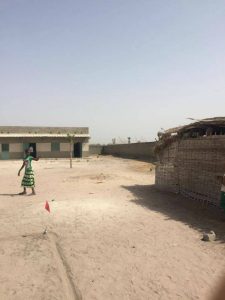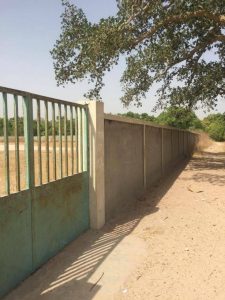This project is made possible through the partnership of WATER CHARITY and the NATIONAL PEACE CORPS ASSOCIATION. ![]()
 Location
Location
This project summary has been redacted for security reasons to omit the specific project location.
Xxxxxxxxx, Kolda Region, Senegal
Community Description
The rural village of Xxxxxxxxx, population approximately 500, lies about 15 kilometers north of the regional capital city of Kolda. There is no electricity and no running water. The village consists mainly of farmers and their families.
The primary school serves students from 4 villages: Soussotou, Saare Samba, Saare Dombel, and Saare Banje. The school currently has 129 students enrolled, 81 males and 48 females.
The community has an organization of parents of students (The Parents d’ Eleves de Ecole Primere Xxxxxxxxx (PdE)) who upkeep and try to improve the school.
Problem Addressed
The school currently has no well, and the nearest water source is from a neighboring compound, about 600 meters away. With no close water supply, the school grounds have no trees or garden crops growing (excluding the young mangoes planted by the PCV and the head of the PDE August 2016.) The PDE and teachers of the school have long wanted the school to be thriving with trees and a student-centered garden, but have not been able to really sustain any attempts because of the distance of the water supply.
When water is needed, students are pulled out of class to fetch water – usually girls. Additionally, there is no shade on the school grounds – as trees have no reliable source of water.
Project Description
This project is to build a well on the eastern perimeter of the school.
 The well will be located between the two teaching buildings. It will be 1 ½ meter in diameter, hand-dug by laborers to a depth of 20 meters. The sides will be reinforced by rebar (locally sold as Fehr #10) arranged in a grid and will be linked in with cement.
The well will be located between the two teaching buildings. It will be 1 ½ meter in diameter, hand-dug by laborers to a depth of 20 meters. The sides will be reinforced by rebar (locally sold as Fehr #10) arranged in a grid and will be linked in with cement.
The sand and gravel for the cement will be sourced locally and brought by the community.
Upon completion of the well, an above-ground structure will be made. It will be approximately 1 meter tall and surround the well in a circle. On top of the structure will be a suspended metal pole (held up by two other pieces) to which a pulley and rope will be attached.
The project includes the purchase of buckets and watering cans.
Immediately upon completion of the well, a tree nursery will be set up with the students and teachers. Additionally, the well will be used to water 9 mango trees that were planted during the rainy season of 2016.
Long-term, the well will be used to continually sustain trees planted in the school. As the school nursery trees mature, they will be planted in the schoolyard and watered with water from the well. Moringa, pigeon pea, mango, and ornamental china pride trees are among the species that will be planted.
Additionally, when school resumes in the Fall of 2017, the well will be used to support garden beds created and seeded by teachers and students. The students will grow bissap, okra, onions, and other assorted vegetables common to the village.
Another intended use of the school space is as a seed and grafted scion source for the community. The well will support grafted mango trees, as well as moringa and pigeon peas. Community members will be able to harvest seeds to plant in their own households as well as use the mangoes as sources for scions. The school can then also be a location for grafting training, moringa nutrition, and transformation training.
 Project Impact
Project Impact
200 people will benefit from the project.
Peace Corps Volunteer Directing Project
Holly Henriksen will manage the project. She previously implemented the Kolda Master Farm Water and Sanitation Project – Senegal.
Monitoring and Maintenance
This project will be monitored by the serving PCV, and volunteers who follow in the village. The Peace Corps indicators that will be measured are tree nursery creation, tree planting, tree survival, and gardens created. Additionally, any pieces of training associated with trees planted at the school (mango grafting, moringa transformation, and nutrition, etc.) will be recorded – the number of participants and other relevant information.
Maintenance of the actual structure of the well should be unnecessary in the coming years as it will be built to a high standard. The external structures (pulley, metal overhanging bar, buckets, and watering cans) can be maintained with funds from the school and PDE.
Maintenance and care of the trees and garden beds will be sustained by the students and overseen by the teachers, headed by the principal.
Let Girls Learn
This project supports Let Girls Learn. Currently, the school needs water to wash chalkboards, water the 9 mango trees planted, and wash hands. The water is retrieved exclusively by female students, who are pulled out of class to fetch water. Often, they are pulled out of class while class is in session. The addition of a well to the school will save the time that these female students are out of class getting water and increase their amount of time spent in the classroom learning.
Fundraising Target
$1,500
Funds raised in excess of the project amount will be allocated to other projects in the country.
Donations Collected to Date
$0
ADOPT THIS PROJECT BY CONTRIBUTING THE DOLLAR AMOUNT OF THE PROJECT
Donations of any amount will be appreciated. The full amount will give you “naming rights” if that is something you would like.
Dollar Amount Needed
$1,500![]()